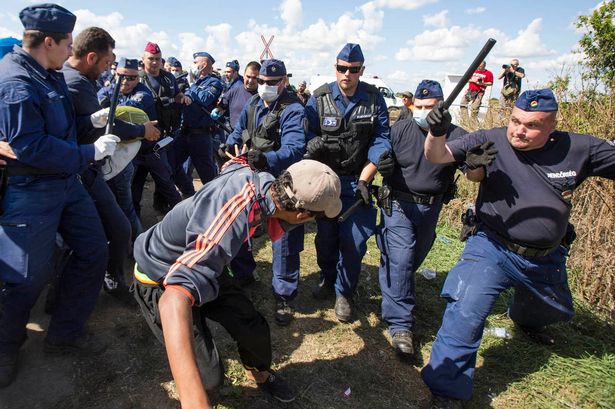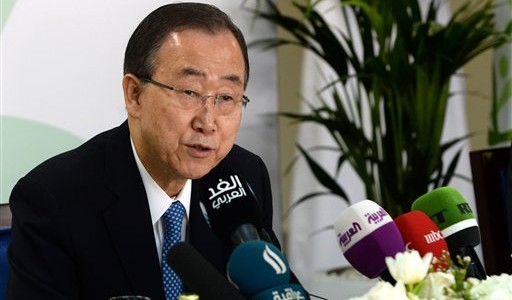 U.N. Secretary-General Ban Ki-moon says border restrictions being imposed in Europe to stem the flow of migrants “are not in line with international law or with common human decency.”
U.N. Secretary-General Ban Ki-moon says border restrictions being imposed in Europe to stem the flow of migrants “are not in line with international law or with common human decency.”
 Ban made the comments Tuesday in Madrid after Greek police said up to 10,000 mostly Syrian and Iraqi refugees were stuck at the country’s Idomeni border crossing in deteriorating conditions.
Ban made the comments Tuesday in Madrid after Greek police said up to 10,000 mostly Syrian and Iraqi refugees were stuck at the country’s Idomeni border crossing in deteriorating conditions.
The Idomeni crossing has become a key flashpoint in Europe’s migration crisis. Several nations led by Austria have imposed refugee caps and border restrictions over the past 10 days, creating a huge backlog of migrants in Greece.
Ban says he’s concerned about the restrictions along land migration routes, adding that “every asylum seeker has the right to his or her application to be considered individually.”
___
5:55 p.m.
Senior police officials from countries along the so-called Balkan migrant corridor have agreed to work together to establish a flow of migrants along the route that will ease the pressure at the border between Greece and Macedonia.
Officials from Macedonia, Serbia, Croatia, Slovenia and Austria said Tuesday that control of the region’s borders is crucial to prevent illegal entry, while allowing through those who have the right to seek asylum in EU countries. They say joint profiling of migrants is necessary to determine who can proceed.
Serbian police director Vladimir Rebic says “we didn’t discuss quotas, but how to prevent misuse.” He warns uncontrolled migrant flows present a security risk.
Tighter entry rules by the Balkan countries have slowed down the movement along the route, leaving thousands stranded in Greece.
___
5:30 p.m.
Greece’s main media union is deploring the left-led government’s decision to suspend media access to all migrant registration and transit camps in the country.
The POESY union is urging the government to “immediately rescind” the ban.
In a statement Tuesday, the union said there can be no excuse for restricting fundamental rights, and said reporting on the immigration crisis should include living conditions at migrant centers.
The government argued that the decision was dictated by overcrowding at migrant facilities.
___
4:40 p.m.
The German government says Chancellor Angela Merkel will meet French President Francois Hollande in Paris on Friday to prepare for a European Union summit with Turkey.
Merkel views diplomacy with Turkey as the key to reducing the influx of migrants to European Union member Greece. She is resisting pressure for national restrictions like the cap on incoming refugees imposed by Austria.
EU leaders are to meet Turkey’s prime minister in Brussels on Monday in an effort to push forward efforts to protect the bloc’s external border.
___
4:10 p.m.
Austria’s chancellor is holding firm on border restrictions choking the flow of migrants along the Balkan route to West Europe, reflecting the failure of a top EU official to persuade him to change his mind.
Werner Faymann insists his country must control its borders to stop the “unorganized chaos” he says has characterized the EU’s approach to dealing with the migrant crisis.
He said Tuesday that Austria is neither a “waiting room for Germany” nor— in an allusion to Greece — prepared to accept the “policy of waving through” migrants to the rest of the EU through Austria.
Faymann spoke after meeting with European Council President Donald Tusk. Indirectly rejecting the Austrian restrictions, Tusk said all EU nations need to get back to fully applying “common rules” of open borders.
___
3:45 p.m.
German Chancellor Angela Merkel says the buildup of migrants at the Greek-Macedonian border isn’t comparable to the situation last September, when she agreed to let in thousands of people who had piled up in Hungary.
Merkel said after meeting Croatia’s prime minister on Tuesday that preparations have been made in recent months to deal with the hundreds of people arriving daily in Greece. She said: “There are accommodation possibilities … in Greece, they should be used by the refugees.”
Merkel reiterated that the aim is to have a mechanism to distribute refugees arriving in Greece to other European countries. She stressed “there is not a right for a refugee to say, ‘I want to get asylum in a particular country in the European Union.'”
Germany saw nearly 1.1 million people register as asylum-seekers last year.
















